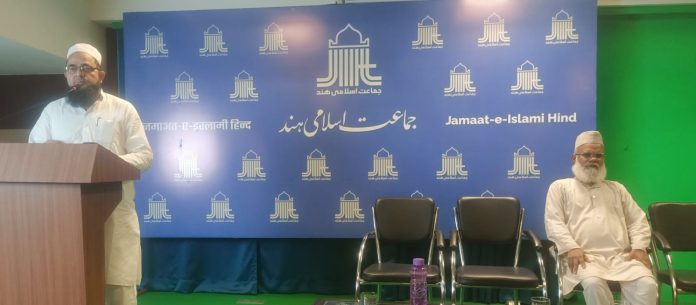In a recent public address at the headquarters of Jamaat-e-Islami Hind (JIH), Maulana Tabrez Alam Qasmi, Convenor of Darul Qaza Committee under All India Muslim Personal Law Board (AIMPLB), highlighted the effectiveness of resolving Muslim family disputes through the Shariah-based Darul Qaza system. Speaking on “Resolution of Muslim Family Disputes in the Realm of Shariah and Law,” Maulana Qasmi revealed that over 80 percent of cases brought to Darul Qaza are successfully resolved at the preliminary stage through mutual consensus.
Despite advancements in education, improved living standards, and increased access to facilities, family disputes, especially those relating to marital relationships, have seen a marked rise, Maulana Qasmi noted.
“The root cause of these disputes stems from a change in perception regarding the institution of marriage. Many now view marriage as merely a partnership or ‘situationship,’ rather than understanding it as a sacred Islamic contract, as prescribed by Shariah,” he said.
He stressed that the foundation of Nikah in Islam is based on the understanding that a wife is not merely a partner, but an integral part of her husband, with mutual rights and responsibilities.
Qasmi also emphasized that while disputes are inevitable, particularly in a value-based society, it is the approach to resolving these issues that is most critical.
“For those who have faith in Allah and the Day of Judgment, the best way to address such disputes is through Shariah. Darul Qaza offers a faith-based and harmonious path to conflict resolution,” he added.
Explaining the workings of Darul Qaza, Qasmi mentioned that around 80 percent of cases are resolved through mutual understanding at the initial stage.
“These resolutions are legally valid through mutual consensus, and even mediation cells, such as that of the Delhi High Court, sometimes direct parties to obtain a Khula certificate from Darul Qaza.”
He further highlighted instances where cases referred from women’s cells in Saket Court were amicably settled by Darul Qaza.
Qasmi also refuted allegations that Shariah courts function as parallel legal systems.
“Darul Qaza is not a parallel court. It operates to alleviate the burden of an already overwhelmed judiciary. Shariah courts have no power of enforcement, and their opinions are not legally binding. However, in practice, courts have not rejected the rulings or opinions provided by Darul Qaza, demonstrating its effectiveness and the respect it commands in the legal landscape.”
Dr. Razi-ul-Islam Nadvi, National Secretary of JIH, echoed similar sentiments in his presidential address. He emphasized that disputes in marital relationships could be significantly reduced if individuals focused more on fulfilling their obligations rather than solely asserting their rights.
Drawing an analogy with corporate hierarchies, he said, “In the family system, the husband is considered the head, but this does not grant him dictatorial authority. He, too, must adhere to the guidelines of Islamic family values.”
Dr. Nadvi also underscored the proactive role JIH plays in preventing marital disputes through its Pre-Marriage and Post-Marriage Counselling initiatives. He called for a stronger focus on education and understanding of marital responsibilities in order to reduce the increasing incidence of family discord.
The gathering highlighted the importance of Darul Qaza and Shariah-based conflict resolution as a valuable resource for resolving disputes in the Muslim community, while also aiding the formal judiciary in clearing the backlog of cases.




